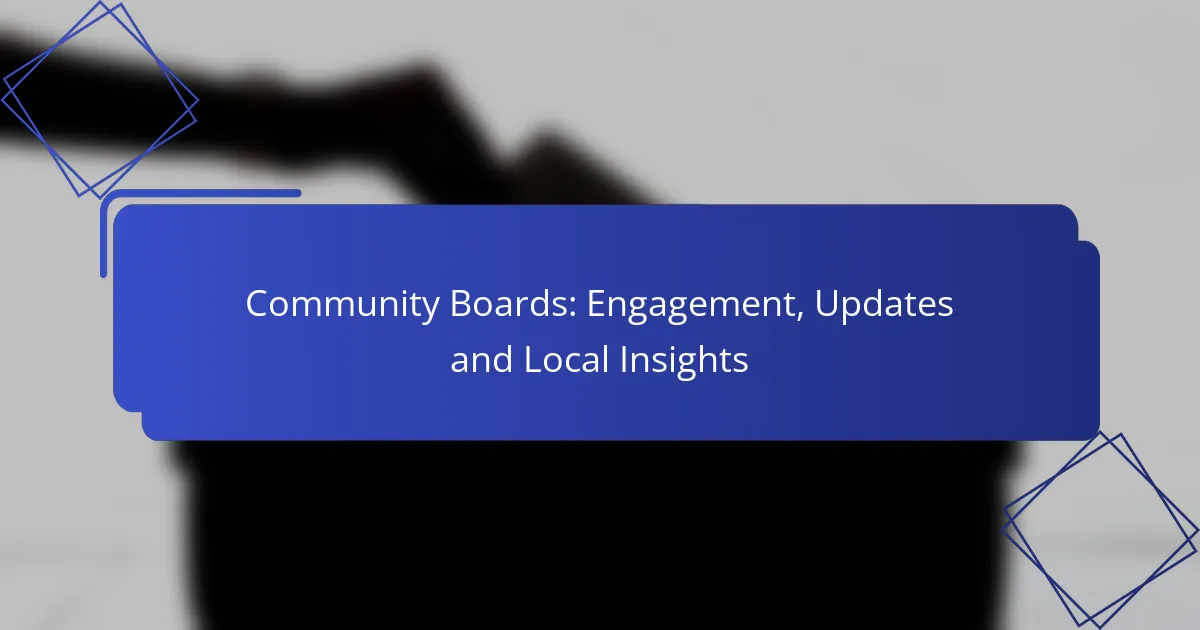Community boards serve as essential platforms for local engagement, allowing residents to actively participate in decision-making and share valuable insights. They provide crucial updates on governance, projects, and safety issues, ensuring that community members remain informed and involved in shaping their neighborhoods.

How can community boards enhance local engagement?
Community boards enhance local engagement by providing a structured platform for residents to participate in decision-making processes and share their insights. These boards foster a sense of belonging and encourage active involvement in community affairs, leading to more vibrant neighborhoods.
Increased participation in local events
Community boards play a crucial role in boosting participation in local events by organizing activities that cater to diverse interests. They often promote events like farmers’ markets, festivals, and workshops, which can attract hundreds of residents. Engaging residents through surveys or polls can help tailor events to community preferences, ensuring higher turnout.
To maximize participation, community boards should utilize various communication channels, such as social media, newsletters, and local bulletin boards. This multi-faceted approach helps reach a broader audience and encourages more residents to join in.
Facilitated communication between residents and officials
Community boards serve as a vital link between residents and local officials, facilitating open dialogue about community needs and concerns. Regular meetings allow residents to voice their opinions and ask questions directly to decision-makers, fostering transparency and trust. This two-way communication can lead to more informed policies that reflect the community’s desires.
To enhance this communication, boards can implement feedback mechanisms, such as suggestion boxes or online forums, where residents can share their thoughts at any time. This ongoing engagement helps keep officials accountable and responsive to community issues.
Promotion of local businesses and initiatives
Community boards actively promote local businesses and initiatives by highlighting them in newsletters, social media posts, and community events. This support not only boosts local economies but also fosters a sense of pride among residents for their neighborhood. Collaborating with local entrepreneurs can lead to unique events that showcase the community’s offerings.
Additionally, boards can create initiatives that encourage residents to shop locally, such as “shop local” campaigns or business fairs. These efforts can significantly increase foot traffic to local establishments, benefiting both businesses and the community at large.

What updates do community boards provide?
Community boards offer vital updates that keep residents informed about local governance, projects, and safety issues. These updates typically include meeting schedules, local project developments, and public safety announcements, ensuring community members stay engaged and aware of important happenings.
Meeting schedules and agendas
Community boards publish meeting schedules and agendas to inform residents about upcoming discussions and decisions. These meetings usually occur monthly or quarterly, and agendas are often available a week in advance, allowing community members to prepare and participate effectively.
To stay updated, residents should regularly check the community board’s website or subscribe to newsletters. Engaging in these meetings can provide valuable insights and opportunities to voice concerns or support local initiatives.
Local project developments
Updates on local project developments inform residents about ongoing and upcoming initiatives that may affect their neighborhoods. This can include infrastructure improvements, parks, and community services, often funded through local budgets or grants.
Residents can track project timelines, budgets, and impacts by attending community board meetings or reviewing project updates online. Engaging with these developments allows residents to provide feedback and advocate for their community’s needs.
Public safety announcements
Public safety announcements are crucial updates that inform residents about crime trends, safety initiatives, and emergency preparedness. These announcements may include alerts about local crime spikes, safety workshops, or changes in local law enforcement practices.
Residents should pay attention to these updates, as they can help enhance community safety. Participating in neighborhood watch programs or community safety meetings can further strengthen local safety efforts and foster a collaborative environment.

How to effectively engage with community boards?
Engaging with community boards involves active participation and communication to influence local decisions. By attending meetings, submitting concerns, and joining committees, residents can ensure their voices are heard and contribute to community development.
Attending board meetings
Attending board meetings is a direct way to engage with community boards. These meetings typically occur monthly or bi-monthly and provide a platform for residents to hear updates and express their views. Check your local board’s schedule online to find out when and where meetings are held.
During meetings, residents can participate in public comment sessions, which usually allow a few minutes for each speaker. Prepare your points in advance to communicate effectively and stay within the time limit.
Submitting community concerns
Submitting community concerns is essential for voicing issues that affect your neighborhood. Most community boards have a formal process for residents to submit concerns via email or through a dedicated online portal. Ensure your submission is clear and concise, outlining the issue and any proposed solutions.
Consider including relevant details such as location, potential impacts, and any supporting evidence. This will help board members understand the urgency and importance of your concern, increasing the likelihood of a response.
Joining local committees
Joining local committees is an excellent way to engage more deeply with community boards. Committees often focus on specific issues, such as zoning, parks, or public safety, allowing you to contribute your expertise or passion. Research which committees align with your interests and inquire about membership opportunities.
Active participation in committees can lead to meaningful changes in your community and provide networking opportunities with other engaged residents. Be prepared to attend regular meetings and contribute to discussions and projects.

What are the benefits of community board participation?
Participating in community boards offers numerous advantages, including access to local resources, networking with influential leaders, and the ability to influence local policy decisions. Engaging with these boards can enhance community ties and provide valuable insights into local governance.
Access to local resources
Community boards often serve as a hub for local resources, including funding opportunities, educational programs, and social services. By participating, members can gain firsthand knowledge of available resources that can benefit themselves and their neighbors.
For example, local boards may provide information on grants for community projects or workshops on skills development. Engaging with these resources can lead to improved community initiatives and personal growth.
Networking opportunities with local leaders
Joining a community board allows individuals to connect with local leaders, including elected officials, business owners, and activists. These connections can foster collaboration and open doors to new opportunities within the community.
Networking can lead to partnerships for community projects or initiatives, enhancing the impact of local efforts. Attending board meetings and events can help build relationships that are beneficial for both personal and community advancement.
Influence on local policy decisions
Community board participation provides a platform for individuals to voice their opinions and influence local policy decisions. Members can advocate for changes that directly affect their neighborhoods, ensuring that community needs are addressed.
By actively engaging in discussions and providing feedback on proposed policies, participants can help shape the direction of local governance. This involvement is crucial for ensuring that policies reflect the community’s priorities and concerns.

How do community boards operate in major cities?
Community boards serve as local advisory bodies that facilitate resident engagement and influence decisions on neighborhood issues. They typically consist of appointed members who represent various community interests and provide input on local policies, development projects, and resource allocation.
New York City community board structure
New York City has 59 community boards, each representing a specific geographic area. These boards are composed of up to 50 members, who are appointed by the borough president and city council members. They meet monthly to discuss local concerns, review land use applications, and provide recommendations to city agencies.
Community boards in NYC also play a crucial role in the budget process, allowing residents to voice their priorities through participatory budgeting initiatives. This engagement helps ensure that community needs are addressed in city planning and resource distribution.
Los Angeles community board functions
In Los Angeles, community boards, often referred to as neighborhood councils, serve to empower local residents in decision-making processes. There are over 90 neighborhood councils, each with its own governing board elected by the community. These councils focus on issues such as public safety, local development, and community services.
Neighborhood councils in LA have the authority to allocate funds for community projects and events, fostering grassroots initiatives. They also act as a liaison between residents and city officials, ensuring that community voices are heard in municipal matters.
Chicago community board engagement
Chicago’s community boards, known as advisory councils, aim to enhance civic engagement and address local issues. These councils are formed around specific neighborhoods and consist of residents who volunteer to represent their community’s interests. They meet regularly to discuss neighborhood concerns and collaborate with city departments.
Engagement in Chicago’s community boards often includes public forums and workshops, allowing residents to contribute ideas and feedback on local policies. This participatory approach helps build stronger community ties and ensures that local governance reflects the needs of its constituents.

What criteria should be considered when joining a community board?
When considering joining a community board, it’s essential to evaluate local residency requirements and your commitment to community service. These factors ensure that members are genuinely invested in the community’s well-being and have a stake in its development.
Local residency requirements
Most community boards require members to be residents of the area they serve. This residency criterion ensures that board members have a direct understanding of local issues and can represent the community’s interests effectively.
Residency requirements can vary significantly; some boards may require proof of residence, such as utility bills or lease agreements, while others may have more flexible criteria. It’s advisable to check specific regulations for your local board to ensure compliance.
Commitment to community service
A strong commitment to community service is crucial for anyone looking to join a community board. This commitment often involves attending regular meetings, participating in local events, and engaging with residents to address their concerns.
Potential members should assess their availability and willingness to contribute time and effort. Many boards expect members to dedicate several hours each month, so it’s important to balance this commitment with personal and professional responsibilities. Engaging in community service prior to joining can also provide valuable insights into the board’s work and priorities.



